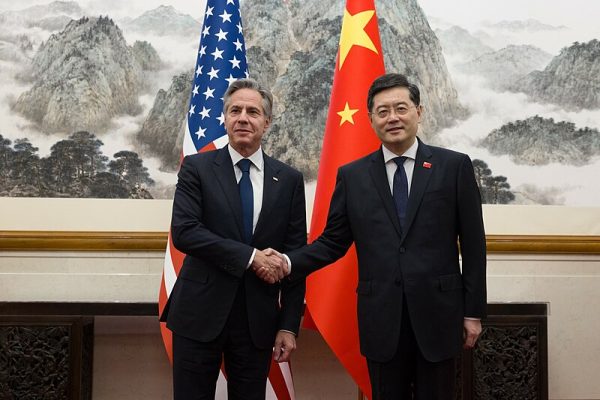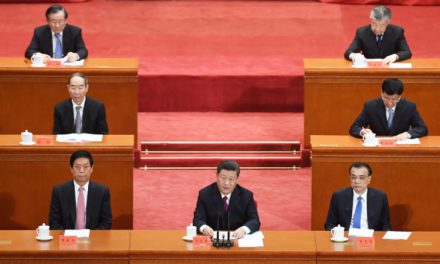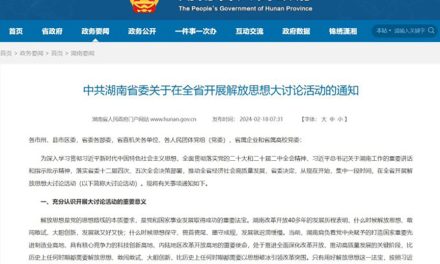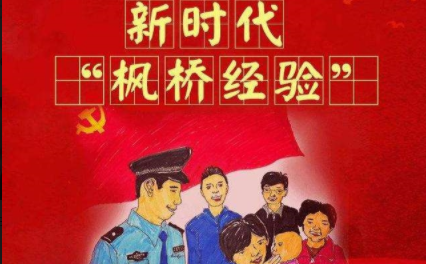By: Emily
Qin Gang has passed away! American media outlet Politico released a bombshell report, claiming that the former Chinese Foreign Minister was arrested for allegedly leaking military secrets of the Chinese Communist Party to the West and was tortured to death or committed suicide in Beijing in July. Although this news may be false, it is a confirmed fact that Qin Gang has been missing without a trace since July 2023. To this day, the whereabouts and reasons for his disappearance remain a massive mystery. At the end of 2023, as China’s four-decade-long era of glory fades, it is fitting to write about this fallen former star of Chinese diplomacy.
The rise and fall of Qin Gang, a typical representative of the bureaucratic elite who grew up during China’s reform era, embodies the dramatic changes in the Chinese political environment. The shift from valuing officials for both competence and political loyalty to now emphasizing loyalty to Xi Jinping above all else is starkly evident. Qin’s rapid rise to become a member of Xi’s inner circle and his subsequent disappearance as a high-profile Foreign Minister have both been sensational. “Qin was Xi’s favorite, and the key figure behind both his rapid promotion and sudden disappearance is Xi,” said Zhu Zhiqun, Professor of International Relations at Bucknell University, in an interview with the BBC: “Qin’s rise and fall highlight Xi’s ‘absolute authority’.” Thus, as the most powerful CCP leader since Mao Zedong, Xi Jinping wields absolute power, allowing arbitrary high-level personnel changes in an opaque system, disregarding the international reputation cost that the nation and its people must bear. This further exacerbates the international community’s doubts about China.
Despite lacking experience in close contact with the United States and never having served there, Qin Gang was exceptionally promoted to the Chinese Ambassador to the United States and then rapidly ascended to Foreign Minister. This meteoric rise could plausibly be attributed to his demonstrated loyalty, aligning with the ambitions of the top leadership. Stephen McDonell, BBC correspondent in China, noted: “Qin’s promotion after serving as Director of Protocol in the Foreign Ministry from 2014 to 2017 brought him closer to the core circle.” During this period, Xi Jinping’s international visits were warmly welcomed by many countries. For example: In 2015, the British Royal Family welcomed Xi Jinping and his wife into Buckingham Palace with a royal carriage; in 2016, Xi visited Cambodia, where the Cambodian Royal Palace publicly displayed a foreign leader’s portrait for the first time; in 2017, U.S. President Trump and his wife hosted a grand dinner for Xi Jinping and his wife at Mar-a-Lago. These visits helped Qin Gang establish a close working relationship with Xi Jinping and left a very positive impression on the Chinese leader.
Tom Phillips, a journalist with The Guardian, observed that since Xi Jinping became the CCP head in 2012, there has been an increasing phenomenon of propaganda glorifying Xi’s political image. The cult of personality is evident in various forms, including books, comics, songs, and even plays emphasizing loyalty to Xi. Phillips believes “Xi is waging a propaganda and ideological war aimed at elevating his status and draining the vitality of any opposing thoughts or groups.” However, Qin’s downfall was apparently not due to opposing the cult of personality. He held a positive view of the propaganda about the top leader and actively participated in shaping the lofty image of the top leadership due to his job responsibilities. A diplomatic scene that Qin Gang is proud of and may have been led by him behind the scenes highlights Qin’s feelings as a nationalist. Qin said: “Germany is known for its precision. When President Xi Jinping arrived at the airport and stepped out of the cabin of his special plane, German warplanes flew over the airport at the right moment, showing respect to President Xi.”
Qin believed that the high-level of special courtesy extended to Xi by various countries was a high recognition of “China’s status as a great power” and a “respect for President Xi’s stature as a leader of a great power.” He further expressed his emotions: “As a Chinese, every time I see these scenes, I deeply feel the glory brought by the prosperity and development of our country, and the sense of honor and pride for our nation and the Chinese people naturally surges in my heart.”
Qin Gang was born in 1966 in Tianjin, China. According to the modern history of the CCP, Tianjin witnessed the humiliation of China under foreign imperialist forces and unequal treaties, an education in “patriotism” that deeply influenced the young Qin Gang. Veteran journalist Terrel J. Jones, who knew Qin thirty years ago, shared his experience of encountering Qin in a hotel lobby. Their conversation was very pleasant, but “Qin suddenly became furious, not hiding his anger at Washington’s attempts to isolate China and prevent its rise.” They were discussing a resolution of the U.S. Congress and a letter from U.S. senators, urging the members of the International Olympic Committee not to vote for Beijing due to China’s human rights record. Jones also observed, “Before serving as China’s ambassador to Washington, as a spokesman for the Foreign Ministry and as a deputy minister, Qin was an active hawkish figure towards the U.S.” Qin’s experience reveals why mediocre leaders like Xi Jinping could quickly establish their prestige and win the support of the people. One reason is Xi’s clever use of the Chinese people’s desire to return to a position of world power after experiencing a “century of national humiliation.”
On the other hand, during Qin’s adolescence, Deng Xiaoping proposed a new vision of modernizing China through cooperation with the United States and Western capitalist countries. “Despite all the deep-seated ‘strategic issues’ in China,” Professor Chen Jian pointed out, “its economy, society, culture, and ideology have undergone profound changes since the reform and opening up.” During Qin’s youth, China experienced massive political demonstrations and protests in 1989, calling for political reform, democracy, freedom, and anti-corruption. Lai Xiaogang, a Chinese-Canadian scholar, noted that Deng Xiaoping’s use of the military to suppress peaceful protests in 1989 “left an everlasting bloody wound on the People’s Republic of China and caused the PRC to lose the soul of Marxism.” Post-Tiananmen China had to quietly incorporate elements like “Confucianism, nationalism, and capitalism” into its identity politics. These elements would also permeate the values of bureaucratic elites like Qin to varying degrees, with his nationalist side possibly being misconstrued by Xi as mere personal loyalty. Naturally, Qin would also be deeply influenced by China’s indigenous Confucian culture.
Jones further said: “Qin’s rise was astonishing, even being appointed as a member of the State Council in March 2023, a rank higher than a Chinese cabinet minister, clearly indicating that he was an important professional figure handpicked by Chinese President Xi Jinping.” In other words, given Qin’s age, he had a great chance of entering the highest leadership of the CCP in the future. However, Jones also astutely noted that after Qin became ambassador to the U.S. in July 2021, “he seemingly became more diplomatic on the surface.” Jones cited several passages from Qin’s farewell article in The Washington Post when he left his position as ambassador: “At the ports of Boston and Long Beach, I saw piles of containers coming from or going to China, proving the high economic interdependence between our two countries and reminding people that decoupling is in no one’s interest.” “I also believe more firmly that Americans, like the Chinese people, are broad-minded, friendly, and hardworking. The future of our two peoples, and indeed of the entire planet, depends on a healthy and stable Sino-U.S. relationship.”
Additionally, Stephen McDonell, the BBC’s correspondent in China, also explored the “dramatic end of Qin Gang’s era as China’s global public image”. McDonell wondered how Qin, “seemingly with strong support from China’s omnipotent leader, was brought down.” McDonell speculated on one possibility, “Rivals within the Communist Party used Qin’s morally reckless behavior to arrest him.” But, “while such behavior is not illegal, it may be considered a violation of party discipline.” McDonell guessed another possibility: “If Qin did something, even something small, that threatened the party’s control of power, it could destroy him.” At the same time, McDonell also noticed the change in Qin after he became ambassador to the U.S., “This fluent English-speaking, avid sports fan was caught on camera at an NBA game in the U.S., taking a shot from the free-throw line.” McDonell thought “junior officials in the Ministry of Foreign Affairs might have seen this and resented it. For some within the party, perhaps this person is not ‘wolf warrior’ enough.”
Li Nanyang is the daughter of Li Rui, a representative figure of the liberal faction within the CCP. Her recollections of her father might help us understand why Qin Gang adjusted his assessment of China-U.S. relations after arriving in America. Li Nanyang mentioned asking her father when he became enlightened, wondering if it was due to his expulsion from the Party in the 1959 Lushan Conference and imprisonment during the Cultural Revolution. Li Rui responded that his true awakening occurred after he was rehabilitated and set foot in the United States in 1979. He was struck by the prosperity and freedom in America, the casual and calm demeanor of the people, and the peaceful atmosphere, leading him to a profound realization: “This is the socialism we are pursuing; this is our ideal state.” Similarly, Qin Gang, after visiting 22 states in the U.S. and discovering a different America beyond Washington, D.C., likely underwent a similar transformation. The prosperity and freedom of the American people might have led to his own awakening.
Why did Li Rui and Qin Gang, who experienced the true face of America in different eras, undergo such similar transformations? This might be explained by the profound impact of Confucian culture on the Chinese, especially the cultural elite, in terms of ethical cognition, morality, and social order. Absorbing superior elements from Western civilization, such as universal suffrage and the separation of powers, on the foundation of Confucian civilization can be more effective in achieving successful social transformation. This approach involves respecting traditional values while adopting successful systems, as evidenced by Taiwan’s freedom, democracy, and prosperity, proving that Confucian civilization can embrace modern democratic systems. From this perspective, the “original aspiration” for the Chinese should be the Chinese civilization based on Confucian thought, not the bankrupt, fanciful communist ideal.
Moreover, modern Neo-Confucianism interprets Confucianism as a cultural tradition with a religious nature, not merely an ethical and moral system, but also encompassing profound contemplation of the universe and spirituality. Notably, Confucian thought has always had a radical humanistic tendency since its inception. Li Rui and Qin Gang, as social elites nurtured by Chinese culture, are more likely to prioritize the interests of the Chinese people over their commitment to the illusory belief in “communism.” Especially Qin Gang, having received contemporary political education and being a professional diplomat, would naturally resist the “wolf warrior diplomacy,” which does not align with Confucian humanism.
Patrick M. Cronin, the Asia-Pacific Security Chair at the Hudson Institute, pointed out that Qin Gang “had disagreements with Xi Jinping on how to handle foreign policy issues, especially policies towards the United States. Qin appears to have become a scapegoat for the troubled U.S.-China relationship.” For example, in March 2022, Qin Gang said in an interview, “China-Russia cooperation has no taboo but also has boundaries. These boundaries are established based on the purposes and principles of the UN Charter.” However, in March 2023, Xi Jinping’s visit to Moscow and his warm interaction with Putin, calling each other “dear friends,” was interpreted as Xi’s firm support for Putin, showing the Xi regime’s resistance to the current international norms, especially considering that the International Criminal Court had just issued an arrest warrant for Putin a few days earlier. Qin Gang insisted that China adheres to the purposes and principles of the UN Charter because he realized that this is the premise for Chinese people to trade with Western powers. He also understood deeply that the containers piled up in the ports of Boston and Long Beach symbolize job opportunities for many ordinary Chinese to support their families. Experts estimated that China’s trade surplus with the United States was $197.7 billion in 2022.
However, as China’s supreme leader, Xi Jinping focuses on maintaining and consolidating the absolute rule of the Xi regime over the Chinese people. Some believe that more pragmatic bureaucrats like Qin Gang might be dismissed for being perceived as disloyal to Xi personally. Xi is a self-appointed “people’s leader” but lacks the basic qualities of a leader, and naturally, there is no screening mechanism for his election campaign, nor has he really risen through China’s rigorous elite training system. Xi often mispronounces commonly used words and flaunts laughable reading lists, suggesting he was a mediocre presence in the bureaucratic elite circle. The reason such a low-capability person could become the leader of the Communist Party, according to Wu Guoguang, a senior research scholar at the Stanford Center on China’s Economy and Institutions, is the support of the autocratic CCP power system. Since Xi always puts the interests of the party’s clique above the interests of all the people of China, for the beneficiaries of the CCP system, Xi’s ability to govern the country is not the most important issue, but more crucial is Xi’s willingness to loyally serve their so-called communist cause.
On the eve of the anniversary of the founding of the Chinese Communist Party in 2023, the CCP’s official magazine “Qiushi” published a speech by Xi Jinping, encouraging young cadres to stay firm in their beliefs. At the same time, Xi warned, “If the people we train do not believe in Marxism, Communism, or uphold the banner of socialism with Chinese characteristics,” it might lead to a crisis similar to the disintegration of Eastern Europe and the Soviet Union. Around the same time, Foreign Minister Qin Gang suddenly disappeared from public view, and his private life scandal was widely exposed in the media. Despite China’s strict internet censorship, reports involving Qin Gang were not blocked. In contrast, on November 2, 2021, tennis star Peng Shuai posted on Weibo claiming she had a coercive extramarital relationship with former Chinese Vice Premier Zhang Gaoli. The post was quickly deleted, and the spread of this news was suppressed in China. This suggests that Xi Jinping might have intentionally allowed Qin Gang’s private life scandal to be widely exposed in the media, to cover up an embarrassing fact that his carefully cultivated person was changing his flag and banner.
Mark, the host of “Eagle and Shield” under “Voice of America,” revealed in his “Mark Time” that “Qin Gang’s dismissal and the purge of the Rocket Army were said to be triggered by a leak incident, possibly related to the CIA’s subversion.” Whether or not he was truly subverted, Qin Gang’s transformation from a young nationalist to a mature pro-American diplomatic professional is well-founded. Besides his public statements, in the interview with his rumored girlfriend Fu Xiaotian on Phoenix TV’s “Dialogue,” Qin Gang mentioned that he often went for walks by the lake amidst his stressful work, observing monuments to World War II, the Korean War, and the Vietnam War. He pondered that in its over 240-year history, “the United States has been involved in wars for all but 20-plus years. This is President Carter’s calculation.” This filming was likely carefully orchestrated, naturally, not or only to showcase the rumored intimate relationship, but more likely as Qin’s subtle reminder to his compatriots that the United States is a country skilled in war with a powerful military force. It can be speculated that Qin’s approach to U.S. politics is grounded in China’s actual interests, advocating for peaceful coexistence with the U.S.
Recently, to save China’s economy, Xi Jinping personally went to San Francisco to woo American businesses. At this year-end summary time, we can only sigh and recall the fallen former star of Chinese diplomacy – Qin Gang, and incidentally review the “Dream of a Great Power” he and Xi Jinping once had.
This piece was translated from Yibao Chinese. If republished, please be sure to add the source and link https://www.yibao.net/?p=247667&preview=true before the text when reposting.
The views of the author do not necessarily represent those of this journal.
























